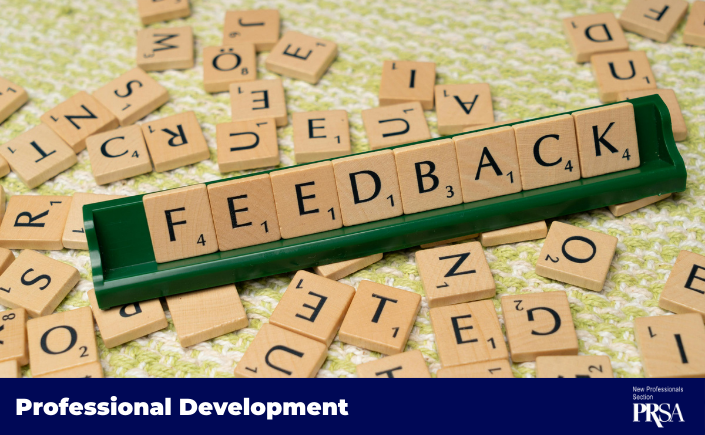By Whitney Conaghan
Early in your communications career, feedback isn’t just expected — it’s essential. Whether it’s a note on your press release draft, commentary on your meeting presence or a full performance review, how you receive and respond to feedback can significantly shape your career. For new professionals, learning to handle feedback with confidence and clarity is one of the most valuable skills you can develop.
This is about more than just having thick skin. It’s about separating your work from your self-worth, engaging with critique productively and using feedback as a real tool for growth.
Detach your ego from your work
One of the most common mistakes early-career professionals make is taking feedback personally. It’s understandable because communications work is creative, individual and often high-pressure. When someone critiques a pitch you crafted or a strategy you designed, it can feel like a personal blow.
It’s important to remember that feedback is about the work, not its creator. Detaching your ego means focusing on improvements rather than personal validation. The most successful professionals develop the ability to view feedback as information that helps them grow, not as a judgment on their abilities.
Show poise in the moment
Hearing constructive feedback can trigger an emotional response. Staying poised means listening without rushing to explain, justify or react. It looks like neutrality in the moment — not agreeing quickly to try to keep the peace, and not scoffing at criticism before fully understanding it. Think of feedback as input rather than evaluation.
After the conversation, take time to let your emotions settle so you can assess the feedback objectively. Ask yourself whether the feedback aligns with your goals or highlights a blind spot you hadn’t considered. Sometimes it helps to keep a log of your feedback so you can identify what works for you, decide where to take action and understand how the input fits into your overall development.
Turn feedback into action
Feedback is only as valuable as what you do with it. Once you’ve had time to process it, the next step is to create a plan. What specifically can you do to improve? Your action plan doesn’t need to be complex, just clear and achievable.
For example, if you were advised to be more concise in your writing, you might want to set the goal of reviewing every email draft and trimming at least 10 percent of the word count. If the feedback was about contributing more in meetings, choose one upcoming meeting where you’ll plan to share an idea. Making small, consistent changes helps build new habits without overwhelming your workflow.
Follow up and close the loop
If someone took the time to give you thoughtful input, take the time to show them you heard it. A quick follow-up can go a long way. Try something like, “Thanks again for your feedback on my last press release. On this next one, I focused on developing more specific story ideas before writing, and I think it helped me keep the angle focused.”
This kind of check-in shows that you value their input and are serious about improving. It also helps strengthen professional relationships built on trust and growth.
Normalize feedback as a two-way part of working relationships instead of something that only happens during reviews or when something goes wrong. Professionals who seek feedback tend to improve faster. By proactively asking for input, you show that you’re invested in your own development.
Instead of asking broad questions like, “Any feedback?” get specific. Try: “What would make my media lists more helpful for the team?” or “What’s one thing I can improve about how I presented the idea to the client?”
Feedback is a career tool
Sometimes, tension around feedback isn’t a sign of disagreement. It might mean the feedback is spot-on, and it simply caught you off guard. Tracking how changes feel over time through self-reflection or simple check-ins helps you find sustainable ways to grow while staying aligned with your natural strengths and energy.
Handling feedback like a pro means being open, curious and committed to improvement. In an industry where the work is fast-paced and highly visible, improvement matters, and those who grow are the ones who build long-term success.
Listen with care, reflect with intention and act with purpose. Learning this skill will serve you for years to come. Keep asking questions and refining your process, and remember — feedback isn’t a test; it’s a tool.
About the Author
Whitney Conaghan serves as the membership chair of the PRSA New Professionals section. She graduated from the University of Oregon in 2023 and is a client services partner at dovetail solutions, a full-service communications agency in Denver, Colorado.

